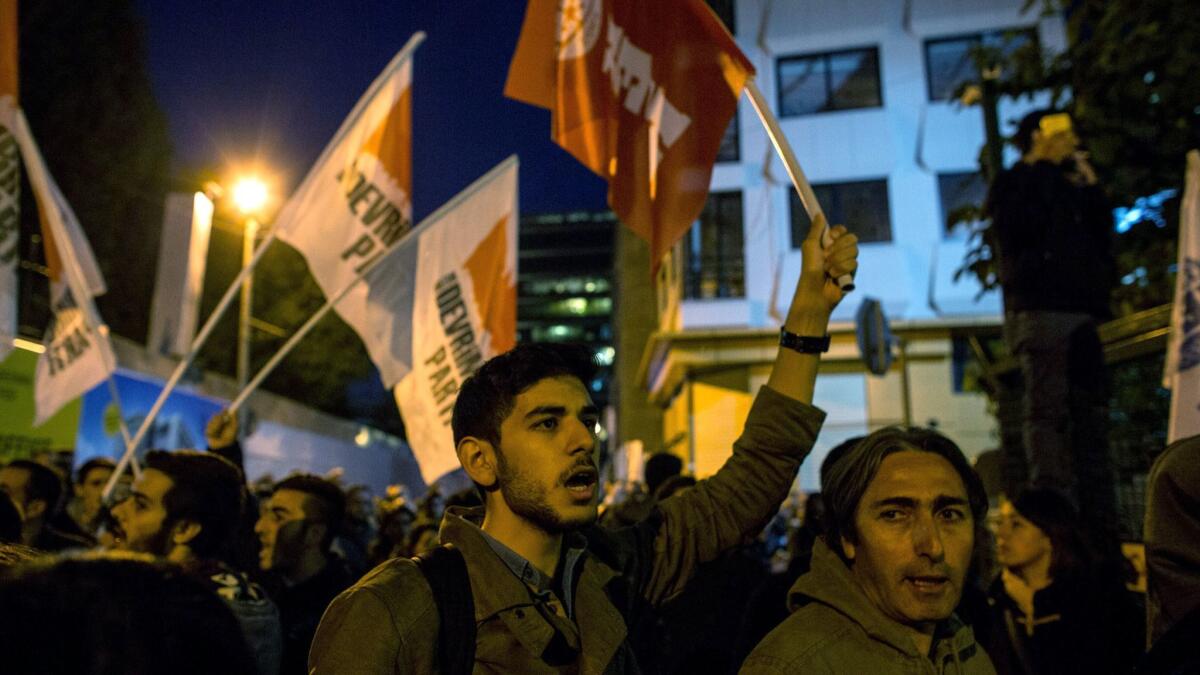Hundreds protest outside newspaper after journalists jailed in growing crackdown in Turkey

- Share via
Reporting from Istanbul, Turkey — Hundreds of protestors camped overnight in protest at the Istanbul headquarters of Turkey’s oldest secular newspaper after its editor and a dozen staffers were detained by police in what many see as a widening crackdown on government critics.
Istanbul prosecutors said the journalists at the Cumhuriyet newspaper were being investigated for supporting groups the government has designated terrorist organizations: followers of Fethullah Gulen, a self-exiled cleric whom the government blames for a July 15 coup attempt, and the Kurdistan Workers Party, or PKK, which has waged a decades-long insurgency.
Prosecutors took issue with the paper’s portrayal of the investigation that followed the failed coup — which so far has resulted in the arrests of 37,000 and the dismissal of 110,000 state workers — as a “purge.” The newspaper is one of the few remaining opposition news outlets in Turkey.
The government also criticized the paper’s coverage of military operations in the Kurdish southeast, suggesting it had made the country’s “counter-terrorism operations look like wars.” At least 1,700 people have been killed and 400,000 displaced since a cease-fire with the PKK, designated a terrorist group by Turkey’s NATO allies, collapsed two years ago.
“Instead of moves to strengthen democracy, we are faced with a counter-coup,” said Kemal Kilicdaroglu, the head of the opposition Republican People’s Party, or CHP, which has historical ties with the newspaper..
“We are faced with a situation where the coup has been used as an opportunity to silence society’s intellectuals and mount pressure on media,” he told reporters while visiting Cumhuriyet’s offices in Ankara.
The detentions have underscored the fears of those who claim the state of emergency imposed after the failed coup is being used to target not only alleged followers of Gulen, but leftist, secular and pro-Kurdish news outlets as well.
“At the beginning after the coup, the government dismissed and arrested those with ties to Gulen, but since then we are seeing this period where all the opposition movement is being targeted, including the Kurdish groups,” said Ahmet Faruk Unsal, the head of Mazlumder, a Turkish human rights monitoring group.
Authorities are targeting individuals who had financial dealings with Gulen-linked banks such as Bank Asya, Unsal said, entities he said were legal until the failed coup.
“If it was a crime, the government has the responsibility to tell people it is a crime first.”
According to the Turkish Journalists’ Assn., 170 media outlets accused of having ties to Gulen or the PKK have been shuttered, and 105 journalists have been jailed. More than 700 other journalists have had their press credentials revoked.
“Yet another red line crossed against freedom of expression in Turkey,” tweeted Martin Schulz, president of the European Parliament.
“The nation draws the red line for us. What importance does your line have?,” Turkish Prime Minister Binali Yildirim responded. “They keep putting press freedom in front of us whenever we take steps in combating terror.”
Over the weekend, the government — citing powers under the state of emergency — ordered the closure of 10 newspapers, two news agencies, and three magazines, saying they had ties to the PKK. Among them was the country’s last remaining Kurdish-language daily.
The same government decree also dismissed 10,131 government workers from various ministries, along with 1,267 academics at public universities. The decree gave President Recep Tayyip Erdogan the power to appoint the heads of universities, a selection process that traditionally is done by academics.
Turkey’s majority Kurdish southeast was the scene of daily protests against the indictment of two prominent elected officials. Prosecutors charged Diyarbakir’s co-mayors, Gultan Kisanak and Firat Anli, with providing support to the PKK. Officials said Kisanak and Anli gave speeches within the last year that supported the PKK and allowed municipal funds and vehicles to be used to transport the bodies of PKK fighters for burial.
At least 11 provinces in the southeast, including Diyarbakir, experienced Internet blackouts after the detentions of the Kurdish officials, as the pro-Kurdish People’s Democratic Party called for indefinite protests.
Farooq is a special correspondent.
More to Read
Sign up for Essential California
The most important California stories and recommendations in your inbox every morning.
You may occasionally receive promotional content from the Los Angeles Times.












